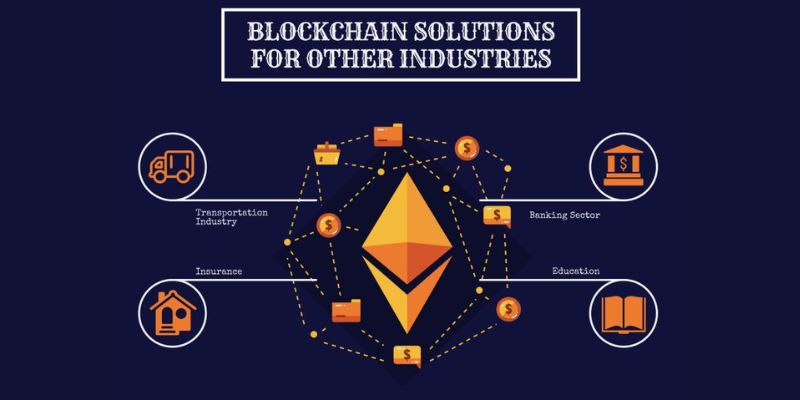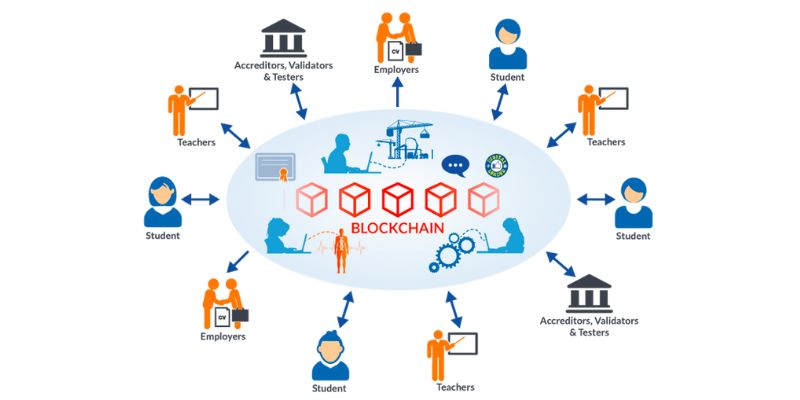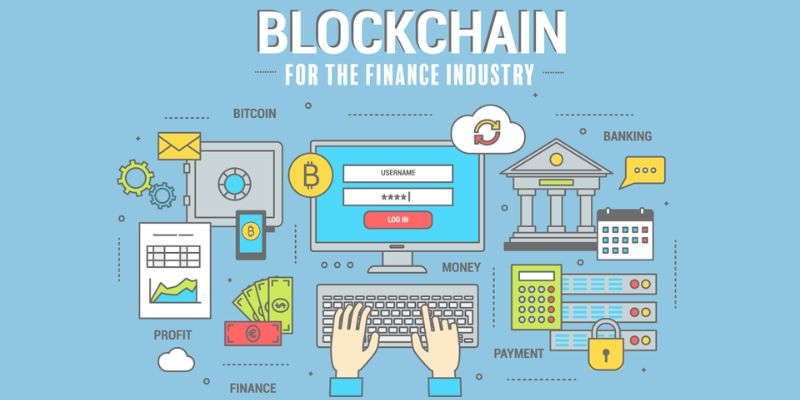Blockchain Beyond Bitcoin: Revolutionizing Varied Industries
Imagine a world where business deals snap into place like Lego blocks, secure and simple. That world is no longer a “what if.” As an expert in blockchain in other industries, I’ve seen this tech spread like wildfire, far beyond its crypto roots. We’re talking healthcare, agriculture, even the arts. Fact: blockchain does more than power Bitcoin. With smart contracts, it’s reshaping how deals are done. In supply chains, it’s the new backbone, bringing trust where it’s sorely needed. Peek into the future with me, and let’s explore how blockchain is sparking a revolution across the board.
Blockchain Technology Expands to Diverse Sectors
Smart Contracts Automate Business Processes
Imagine a world where deals and promises are kept without fail. That’s smart contracts for you. They’re like vending machines. You put in your coin, the machine knows what you want, and out comes your bottle of soda—no human needed to make it happen. Now apply this to business. Sign an agreement, and it runs by itself. The rules are written in code.
Smart contracts run on blockchain, just like Bitcoin. But instead of money, they deal with agreements. They can do lots of things. Like ensure you get paid on time. Or, they can keep track of goods as they move around. And do it all without a mistake or delay.
Let’s say you make skateboards. You order wheels from a supplier. A smart contract could make sure they arrive on time. If they don’t, you could get a refund right away. It’s fair, fast, and no one can fiddle with the system. Smart contracts can also make sure no one cheats. So everyone stays honest.
They’re not just for business deals, though. They can do stuff like keep track of land ownership. So, you know no one else claims they own your backyard swing set. Pretty useful, right? And they’re really safe too. Once you set a smart contract going, it’s nearly impossible to stop or change it.
Distributed Ledger Impact on Supply Chain Operations
Next up, let’s chat about how distributed ledgers are changing supply chains. A distributed ledger is like a shared notebook that everyone can see, but no one can rip a page out of. It’s not just one computer that holds the notebook. It’s a bunch of them. Spread out everywhere. So it’s super hard to mess with.
Here, blockchain shines bright. Take a box of oranges headed to a grocery store. With blockchain, you can keep track of that box all the way from the tree it came from to the checkout line. This is big for safety. If someone gets sick from the oranges, you can find out where things went wrong.
It’s also great for making sure things are what they say they are. Like organic, or fair trade, or not made by robots. When everyone can see the same info, it’s easier to trust it. This is helping all kinds of industries, from making clothes to growing food, to sending packages across the world.
It’s not perfect; we’ve still got some kinks to iron out. But blockchain is proving its worth in ways we never thought about before. It keeps things moving smoothly and makes life a little less confusing. And in a world that’s always on the go, that’s something we could all use more of.
Cutting-Edge Blockchain Applications in Healthcare and Agriculture
Revolutionizing Healthcare Data Management
Imagine your health records, safe and easy to share with any doctor you choose. This is how blockchain is changing healthcare. Hospitals and clinics use blockchain to keep your data secure. They can quickly send your records to doctors or nurses anywhere. They no longer need to print or fax your files. This means better and faster care for you, especially in emergencies.
Blockchain stores your health data across many secure places. So, if one computer fails, your records are still safe. No one can change your records without permission, keeping your info correct and private.
Smart contracts help too. They set rules for who can see or change your data. Everyone must agree, which helps stop mistakes or bad actions.
Boosting Efficiency in the Agriculture Sector
Now let’s talk farms. Farmers are using blockchain to track food, from planting seeds to your table. It’s called “farm to fork,” and it keeps food safe. If there is a problem, like a bad tomato in a store, blockchain can find out where it came from, fast. This stops more bad food from getting to you.
In farming, blockchain can help with selling, buying, and shipping. Farmers and buyers use smart contracts to make deals clear and fair. They can see the history of the seeds, water used, and care given to plants. This helps trust and makes good business.
Also, farmers get paid faster. Smart contracts on blockchain pay them as soon as they deliver, with no bank in the middle. They sell food all over the world, with less worry and wait.
Yes, blockchain started with Bitcoin, but now it touches so many parts of life. In hospitals, it keeps us healthy and safe. On farms, it makes sure our food is fresh and good. And this is just the start. Blockchain is growing and can help with even more things in the future.
Remember, it’s all about making life better and safer for all of us. With every bit of data and every farm-fresh tomato, blockchain builds a path to trust and care. And that’s a future worth building on.
Blockchain’s Role in Intellectual Property and Creative Industries
Intellectual Property Protection Across Domains
Creatives and inventors often struggle to protect their work. Blockchain is changing that. This tech joins the fight for their rights, making it hard for others to steal their ideas. It stamps a digital proof on creations. This proves who first made the work or idea. It’s a step up in guarding patents, trademarks, and copyrights.
Think of blockchain as a safe with many eyes on it, always. Every step of a creation’s life is there. It’s clear for all to see but locked from tampering. This keeps folks honest and work safe. And it cuts down the need for costly legal fights. No one can change records once they’re set in the blockchain. That means the true owner stays known.
Streamlining Royalties and Rights in Entertainment
Artists and musicians often wait long and hard for their earnings. How does blockchain help this? It simplifies how money moves from user to creator. Smart contracts, which are like computer programs, enforce the rules. They see that creators get paid when their work is used. This tech can track music or art use instantly. It shares profits right, and fast. No more waiting months for a check in the mail.
Here’s a real kicker: fans can now invest in their favorite artist’s new album. In return, they get a slice of the profits. It’s a new way for talents to get money to create. And it’s fairer for those who put their hearts in their work. With smart contracts, the days of getting shortchanged are fading.
Blockchain doesn’t care if you’re a singer, a director, or a painter. All types of creators can breathe easier. Their art and earnings get the protection they deserve, thanks to blockchain.
In this digital age, blockchain is for everyone. It ensures that the next hit song, or the next masterpiece, stays safe. This helps artists keep the value of their heart’s work. It lets them share it with the world, on their own terms. And most important, it makes sure they get paid fairly and fast. That’s a win for us all.
Integrating Blockchain for Enhanced Transparency and Efficiency
Food Safety Traceability: From Farm to Fork
Blockchain shines bright in the food business. It tracks food from when it grows to when you buy it. Think of a digital trail from farm to fork. It’s like a storybook for your apple or steak, but way more useful.
Why does blockchain in agriculture sector matter? It cuts the risk of bad food reaching you. It quickly finds where problems start. That keeps you safe.
Farmers, stores, and eaters get on board with blockchain. They all see what happens to the food along the way. If something goes wrong, they can act fast.
A good example is Walmart. They used blockchain to track mangoes. What used to take days to trace, now only takes seconds. Yes, seconds!
Blockchain in Logistics: Driving Efficiency and Security
Think of blockchain as a super diary for moving stuff around. It writes down every step a package takes. Once written, no one can change it. This makes everyone trust the system more.
How does blockchain in logistics efficiency work? It helps shippers, drivers, and customers see everything. They know where their package is. They also know it’s safe and sound.
Not just small boxes, big things too! Even cars and machines move better with blockchain. Shippers save time and money. Customers get their stuff faster.
Blockchain keeps the wheels of logistics oiled and rolling better than before. This means your new toy or tool comes to your door without a hitch.
No more lost packages, no more wondering. Blockchain in logistics is like having a superpower for shipping. Trucks, boats, and even planes get where they need to be, smarter.
In this post, we explored how blockchain is changing the game far beyond just tech talk. We saw how smart contracts can now handle complex business deals without a hitch. They’re making sure every agreement in the book gets carried out right on cue. Plus, we can’t ignore how this tech is making the flow of goods crystal clear. It’s like having X-ray vision for the whole supply chain!
But hang on, there’s more – healthcare and farms are getting a high-tech boost too. Medical records are safe and sound, and the way we grow our food is smarter than ever. And for all you creative folks, your hard work won’t go unnoticed. Blockchain’s making sure your ideas stay yours, and that your pockets get filled whenever they should.
What’s really cool is that now we can see where our food comes from, just like that. And sending stuff all over the place? Safer, faster, and slick as can be. So, here’s the deal: blockchain is like the Swiss Army knife for our modern world. It’s making things better left, right, and center – from art to apples. And that’s something we can all get excited about.
Q&A :
How is blockchain technology impacting sectors outside of finance?
Blockchain technology is revolutionizing numerous industries beyond its initial, financial applications. Supply chain management, for instance, harnesses blockchain for enhancing transparency and traceability, ensuring goods are accurately tracked from production to delivery. In healthcare, patient records and pharmaceutical tracking benefit from blockchain’s security and immutability. This is also extending into realms like real estate, where property transactions can be securely recorded, or intellectual property, providing artists and creators a platform for authenticating and monetizing their work.
In what ways are energy sectors benefiting from blockchain?
Blockchain finds a compelling use case in the energy sector through enabling decentralized energy trading platforms. These platforms allow households with renewable energy installations like solar panels to sell excess energy directly to neighbors without a central authority, optimizing energy distribution. Additionally, blockchain’s tamper-proof ledgers bring accountability to carbon credits and renewable energy certificates, promoting transparency and trust in sustainable practices.
Can blockchain technology innovate the agricultural industry?
Yes, blockchain can significantly innovate the agricultural industry by introducing greater levels of traceability, efficiency, and trust. With blockchain, every step of the food supply chain can be recorded, from the farm to the consumer’s table, allowing for complete visibility and assurance of produce origin and handling. This helps in reducing fraud and ensuring food safety, as well as facilitating the prompt identification and response to contamination incidents. Furthermore, it can streamline farmers’ operations and financial transactions, including securing land rights and enabling peer-to-peer transactions.
What role does blockchain play in the education sector?
Blockchain is emerging as a transformative force in the education sector by enhancing the way credentials are issued and verified. Educational institutions are beginning to utilize blockchain to issue tamper-proof diplomas and certificates, simplifying the verification process for employers and other schools. Additionally, blockchain could enable the creation of a decentralized, lifelong learning passport, which would hold an individual’s educational records in a secure and easily accessible format.
How is blockchain being used in the entertainment industry?
In the entertainment industry, blockchain is creating new opportunities for content distribution and rights management. It allows for the creation of transparent and unchangeable records of ownership and royalties, giving content creators closer control over their work and revenue. Blockchain-enabled platforms are also disrupting traditional distribution methods, empowering creators to directly monetize their music, films, or art and fostering direct relationships with their audience. Moreover, with the advent of Non-Fungible Tokens (NFTs), blockchain is also enabling unique ways to buy, sell, or collect digital assets.


